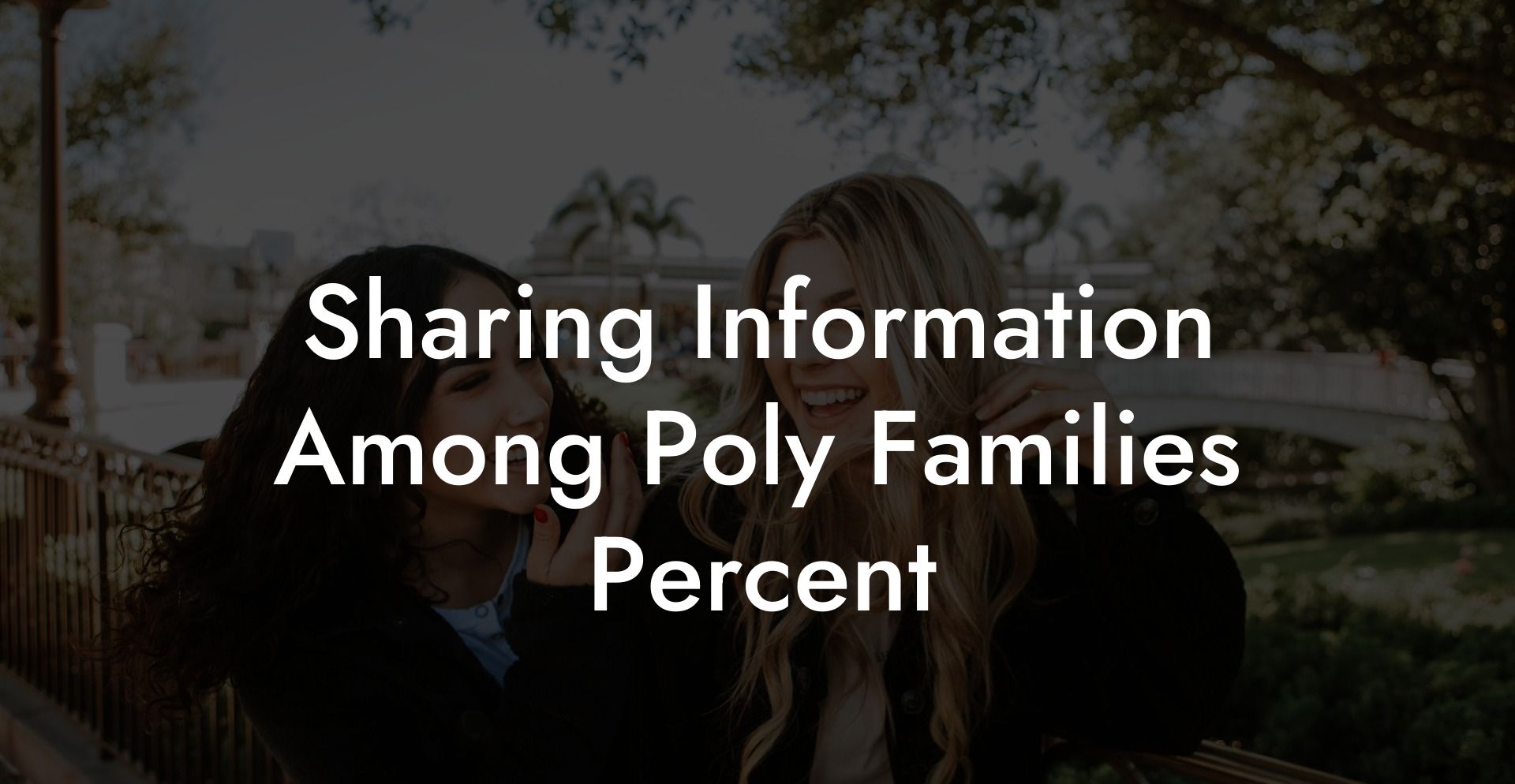Polyamory, also known as ethical non-monogamy, is a lifestyle where people are open to having multiple romantic and sexual relationships. As with any other relationship, communication is critical in these arrangements to ensure everyone involved feels respected and valued. One aspect specific to polyamory is sharing information among poly families – a process that can be both empowering and overwhelming. This article guides you through the importance of open communication, navigating boundaries, and effective strategies for sharing information among poly family members.
Sharing Information Among Poly Families Percent Table of Contents
Why Sharing Information is Important in Poly Relationships
Why Sharing Information is Important in Poly Relationships
When more than two individuals are involved in romantic relationships, open communication becomes more critical than ever for maintaining trust and harmony. Some reasons why sharing information is essential in poly families include:
- Establishing trust: Open communication indicates that all parties trust each other enough to be truthful about their desires, feelings, and experiences. This can be very comforting and reassuring within polyamorous relationships.
- Preventing misunderstandings: Sharing information ensures everyone is on the same page and avoids the potential for confusion or the misinterpretation of one another's feelings and intentions.
- Healthy boundaries: By discussing each other's preferences, feelings, and limits, all participants can learn to respect one another's boundaries and work towards a fulfilling and harmonious arrangement.
Navigating Boundaries in Poly Relationships
Every relationship has its own unique set of boundaries, and the same applies to polyamorous connections. It is essential to navigate and establish these early on, as failure to do so can lead to misunderstanding and hurt. Some steps to establishing boundaries in poly relationships include:
Communicate openly
Discussing your expectations and desires openly can help all parties understand each other's boundaries and intentions. This also involves being honest about your emotional needs and limits to ensure everyone's well-being and satisfaction.
Respect individual preferences
Each person in a poly relationship may have different preferences, desires, and boundaries. It is crucial to honor these differences and agree on a method that aligns with everyone's personal values.
Check-in frequently
Relationships evolve, and boundaries may change over time. Regular check-ins with your partners can help keep everyone on the same page and maintain a supportive, healthy environment.
Effective Strategies for Sharing Information
Sharing information may not come naturally to everyone, but it is essential to build a strong foundation for your polyamorous relationships. Here are some strategies to help ease the process:
Create a safe space for communication
Find a comfortable, judgment-free environment where all parties feel at ease talking about their feelings, experiences, and desires. This can involve setting aside time for group talks, or even creating a group chat for text communication.
Develop a communication system
A specific system for sharing information can make the process more comfortable for all involved. For example, some poly families use a colour-coded calendar to show who is spending time with whom, or a messaging app group for general communication.
Practice empathy and understanding
Active listening and putting yourself in your partners' shoes can help build empathy and understanding, making it easier to navigate the complexities of polyamorous relationships together.
Sharing Information Among Poly Families Percent Example:
Lily, Alex, and Sam are in a polyamorous relationship, and they have agreed on the importance of sharing information and maintaining healthy boundaries. To facilitate this, they have a weekly "family meeting" where they discuss any changes, feelings, or concerns they have had throughout the week.
During these meetings, Lily, Alex, and Sam share updates about other relationships, personal growth, and how they feel about the ongoing arrangements within their poly family. They have agreed on a shared calendar where they can see when each person is spending time with one another, preventing misunderstandings and helping to manage schedules effectively.
By prioritizing openness, empathy, and flexibility, Lily, Alex, and Sam have built a strong and supportive poly family where everyone feels heard and appreciated.
Understanding the importance of sharing information in polyamorous families and implementing effective strategies can create a solid foundation for lasting, fulfilling connections among all parties. By embracing open communication and empathy, navigating boundaries with care, and maintaining a supportive network, you and your partners can thrive within the framework of ethical non-monogamy. If you found this article helpful, be sure to share it with others who may have similar interests and explore the other guides available on The Monogamy Experiment for more in-depth insights into polyamory, monogamy, and all things love.













